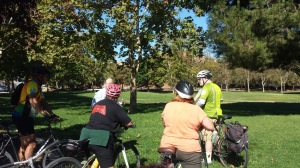
Could the health benefits of a freeway cap cover the cost associated with its construction and maintenance? That’s the question addressed by the authors of a study, Cost-Effectiveness of Capping Freeways for Use as Parks: The New York Cross-Bronx Expressway Case Study, published in the American Journal of Public Health.
The answer to their question is that, in 84% of their simulations, a cap would offer a positive return on investment from benefits like reduction of noise and air pollution, increase in physical activities of the people in the surrounding neighborhood and a reduction in pedestrian/car interactions (e.g. injuries).
This is an academic study and is assumption-laden, however the authors took a conservative approach and, although it focuses on the cross-Bronx expressway in New York City, their goal was to create a model that worked nationwide:
“We chose the higher bounds of costs and the lower bounds of benefits to ensure that the real-world results of any such efforts would be superior to those that we project, that they would be generalizable to other localities, and that they would be robust to cost overruns. In fact, our estimated cost per acre would cover the cost of a freeway-burying project, provided it is not complicated and is well-executed.”
The article also briefly discusses some of the side effects, like the increase in nearby property values and how that could lead to increased gentrification in lower property value areas. Some of the potential benefits that weren’t mentioned, but not included in their analysis, include reduction in asthma and crime.
Further, unlike, the WNAC’s proposal for a cap over I-280, their assumptions include only a park and no commercial or residential activity to offset costs. The report is chock full of useful references. As importantly, the authors are happy to share their data and models to others working on similar projects.
The authors end their report on a hopeful note that these sort of projects can be the sort of bipartisan undertaking that benefits all.
“With sky-rocketing health costs and a strong desire to reduce long-term public-sector expenditures, the time may be right to begin cross-sectorial, bipartisan collaboration efforts to address public health needs.”
Great summary Ken!
LikeLiked by 1 person
Thanks Kirk!
LikeLike